Murder by Death
I read cozy and historical mysteries, a bit of Paranormal/UF, and to mix it up, I read science and gardening books on occasion.
Silverhill

One of Whitney's earlier publications, this one still has the intricate plotting and surprises that are missing in her later titles. Conversely, it's one of the less evocatively atmospheric of hers I've read so far.
The thing a reader has to accept about Whitney is that her whole raison d'être in writing was to thrust heroines into the most unwelcome home she could imagine and have her persevere in spite of all stumbling blocks. It's formulaic, definitely, but each of her earlier novels becomes unique in the setting, the secrets and the mystery.
Silverhill absolutely fits the Whitney formula, and it made me a bit impatient at the start as all the usual hurdles, cruelty and heartache were presented along with the future insta-love (these books were written in the 50's and 60's when apparently if it took you longer than 48 hours to decide you'd met your One True Love, you might as well not bother).
But one all of that was gotten through, the story was a surprise. I thought I knew where it was going, and I was sort of right, but the salient detail of the whole thing blindsided me when it was revealed. So much karma getting doled out to everyone. And, of course, a happy ending for our heroine.
When a good Whitney comes along, they are a pure indulgence to a much more innocent, yet horrific, form of story telling for readers who like their suspense served in tandem with romance, and a touch of gothic for garnish.
 4
4
The Library of the Unwritten (Hell's Library, #1)

A great tale for anyone who loves books, but especially for those who fancy themselves future authors, struggling authors, or really, anyone who'd embrace the title of author in any form.
Myself, I've never found the title of author appealing. My love of books is strictly that of the receiver of stories, and as such, some of the rhapsodic odes to unwritten stories was lost on me, though I connected with the idea of potentiality.
Regardless, once I got into the story, which admittedly took awhile, I was invested. I thoroughly appreciated the author's take on Christian theology and judgement, but had a hard time buying into the creative license she took with heaven on several different levels. There's a serious feminist vibe running throughout the narrative, which is fine, but for the record: God is no more a 'she' than God is a 'he'; God is Omni; God is all, and while it makes no material difference which gender pronoun one uses, the overt use of "she' has always felt petty to me. It was a small blip, but whenever it happened it yanked me out of the story, even if just for a second.
The author's grasp of the mythology of the underworld felt less formed, but only if you really stop to consider; the logic of the plotting cracks a bit around the edges if you stop to consider how she's got the bureaucracy of Hell set up. Don't think about it too much though and it works well enough.
The characters are well written, though Leto's story is obviously the one that is the most fully developed. This is the character the author thought most deeply about, or had enough life experience that bled through into his creation. Which is both unfortunate and haunting, though the result is a character the reader can care about and cheer for. To use Hackworth's logic, Leto is the character most likely to leave his book.
Overall, an engaging story, an adventure. There's a second book out next month that I'll happily read, and I hope this time around we'll spend more time in the library itself.
 6
6
The Red Lamp
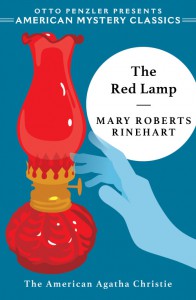
I knew this was a ghost story, of sorts, so I started it bright and early yesterday morning, and became so engrossed in the story that I almost, almost, finished it last night. leaving nothing but 3 of the last 4 conclusion chapters for me to read today.
Mary Roberts Rinehart was an excellent writer; that her genius has been so far forgotten today is a tragedy. The Red Lamp was originally written in 1925, and putting aside the lack of technology and the beautifully elegant writing that today might be considered a tad verbose, the story holds up perfectly; it would take very little to make this story 'modern'.
The Red Lamp is complex to the point of labyrinthine though. Like the main character, I stumbled through the story in ignorance. Some of this was by design, as the mc is meant to be a spectator not an active participant in solving the crimes, but some of it was because there was just so much going on and that beautifully elegant writing of Rinehart's made for easy camouflage of any clues.
The book is, with the exception of the introductory and final 4 chapters, purely epistemological, with no chapters, just journal entries. This style doesn't always lend itself to a submersive experience for the reader, but these journal entries are detailed enough that it makes almost no difference from a first person narrative.
The ghostly part of the story, in spite of the enormous potential for scarring the spit out of me, were subdued enough that they never raised so much as a hair. This was a wee bit disappointing, I admit, but it didn't adversely affect the story; they were never the point of the book, it was always about the mysterious killings and there was never doubt that those killings were done by a very corporeal being.
All in all, this was an excellent mystery. I'd recommend this to anyone curious about Golden Age Mysteries who might be hesitant fearing dry or dated story-telling. While not perfect, The Red Lamp is most assuredly neither dry nor dated.
 4
4
 1
1
The Turquoise Mask
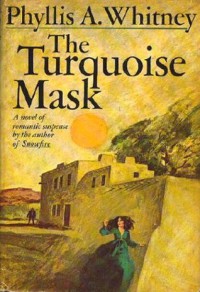
Wow, can Whitney be verbose. Her earlier work has always been better, in my opinion, but this one was an in-between - first published in 1974. Which makes the plotting excellent, and the abuse of the expository extreme. Unfortunately the expository gauntlet must be run for many chapters before a hint of the rewarding plot can be found.
I'm undecided on whether it's worth the effort. The plotting was very well done. I was absolutely certain I knew who the villain was right up until almost the end, when she convinced me I was wrong, that it was really .... and then she blindsided me with the solution that was just unexpected. Whitney got huge bonus points for stunning me, but I'm not sure how I actually feel about it as a legitimate ending. It works, but it feels like it shouldn't.
The characters, and the romance, were, as is typical with both Whitney's writing and the time she wrote in, dramatic and overly simplified. Insta-love has nothing on romantic suspense from the 70's; and characters' personalities are never subtle or nuanced. If you accept this as the style of its time, it's not an insurmountable problem.
The one thing Whitney never lost, no matter how many books she wrote, was her sense of place. I'm not sure I've ever read anybody better at putting the reader in whatever setting she wants them, and making them feel like they were there. Here the deserts of New Mexico are the backdrop, and though I've never in my life seen an adobe house, I feel like I've lived in one the last couple of days.
I'd neither recommend it nor deter anyone from this one; the exposition is a challenge, but if that slow build isn't a deterrent, the story is one of her more complicated and compelling ones.
 I read this for the Romantic Suspense square (which is on my card is the Psych square that's been flipped), for Halloween Bingo 2020.
I read this for the Romantic Suspense square (which is on my card is the Psych square that's been flipped), for Halloween Bingo 2020.
 3
3
Staked (Iron Druid Chronicles #8)

A couple of things occurred to me while reading Staked: it feels like Herne doesn't really like his main character, Atticus; at least, not judging by the amount of existential pain he dumps on him. The other is that I can see the inspiration, right down the the scatalogical humor, of the character in his new series that starts with Ink & Sigil - clearly in Owen, the arch-druid and Atticus' mentor. Owen is quite feral and off-putting, no matter how gold and good his heart may be.
Staked is told through the rotating viewpoints of all three druids: Atticus, Granuaile and Owen, and the meandering is epic. We begin and end with the titular war with the vampires, but in between there's a battle-seer-horse needing rescue, ecological retribution being wrought, treaties being hammered out in Asgard, greek gods getting vaporised, and all matter of other trivia. It wasn't boring but I disliked being passed off between characters, especially when I had little use for Granuaile's daddy issues and Owen's feral lack of expletives that didn't include his bollocks and backside, and those of everyone else's.
I do enjoy Atticus's adventures and character, and I like Oberon even more when I read him, as opposed to listening to a narrator scooby-doo his voice. I enjoy his interactions with the various deities and villains, and especially enjoy the verbal sparring between himself and Leif. It's a detriment to the books, if not the overall story arc, that Hearne felt it necessary to take all of Atticus' interesting friends away from him; he suffers from the lack of intellectually challenging interactions. Overall, though, it was a good enough story to keep me reading, and I enjoyed the ending well enough. If one chooses, one could end the series right here and everything save Ragnarok would be tied up neatly. At this moment, I'm content to leave the series here, but I can't say I won't change my mind.
 4
4
 2
2
The Sun Down Motel
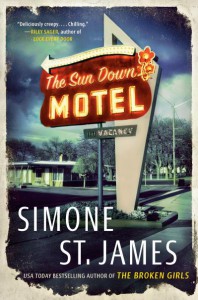
I am not a fan of horror, but I'm a big fan of old-fashioned ghost stories, when read in broad daylight. I've been a big fan of Simone St. James' ghost stories since I first found The Haunting of Maddy Claire, the first of ... five?... historical ghost stories. She branched off in a new direction with The Broken Girls, going with a dual time-line plot, which I read hesitantly, but enjoyed thoroughly. The Sun Down Motel is another such book: a dual time-line mystery firmly rooted around a haunted place, this time a hotel that was pretty much doomed before it ever opened its doors.
I'm still a fan of St. James - I think this was a riveting read, and I devoured it in 2 sittings (daylight hours, all of them), but it wasn't as good as some of her others for two reasons, both purely subjective. The first was the heavy handedness of the message: that women have always been, and sadly will always be, to some extent, vulnerable and expendable. This is as unavoidable a fact as it is an inexcusable one, but more subtle writing would have had more powerful an impact. Instead, there were times - just a few - that I felt like I was the choir and I was being preached at. This wasn't a massive issue; it was just enough to pull me out of my head and the story a time or two.
The second reason is almost silly: the ghosts. They were almost exactly my right level of scary, but, and it took me some time to figure this out, they didn't have quite the effect on me as the ghosts in her previous books, because they never really focused on the main characters. These hauntings were almost the remnant-kind: they were there acting in an endless loop, whether anyone witnessed or not, although there was a trigger. The main ghost communicated with the historical time-line mc, but only once without being pushed into it by Viv. The other ghosts communicated with the present day mc, Carly, but benignly. They were spooky, absolutely, but at a remove, so that they fell just short of spine-tingling.
And I guess, as I write this I was left unsatisfied by Nick's story; it felt like it should be going somewhere and it didn't. I'm also disappointed that there was never an explanation for the present-day entry in the guest book of one James March who registered the day Carly and Nick had their first real experience with the Sun Down Motel. That was a BIG little thing to leave hanging with no follow up.
But overall, it was a good story; I liked that both Viv and Carly had solid friendships in their timelines; I liked that Nick was her support from pretty much page 1, and I liked the investigatory process of the mystery plot, even if I thought Viv was a reckless idiot. The story sucked me in, and I remain a solid fan of St. James' books.

 4
4
Urban Aviary: A Modern Guide to City Birds

I bought this because it was pretty. The author takes us on a whirlwind tour across the world, highlighting one bird in each major city that has, despite all the odds, thrived. Each gets one page, and the facing page is a watercolour of the bird, done by Marc Martin, and each is astonishingly wonderful in its simplicity and detail.
As a bonus to the eye-candy, I learned quite a bit about a range of birds; even the ones I'd already heard of had facts that were new to me, so it's a win all around.
 7
7
Consider the Platypus

I had this book on my list to buy long before it was published, so when I did buy it a few months ago, I was surprised: I was expecting the book to be about the platypus. Silly me.
It is, instead, a book about the animals that display aspects of evolution in its most baffling forms, or animals through whom are knowledge of evolution and homo sapiens has been advanced. It's cheekily written, and could almost be used as a supplemental text for introductory classes in high-school, though it's nowhere near comprehensive enough. Each animal gets between 2-4 pages, with a generous, though not excessive, illustrations.
I learned a bit about just about everything, and learned about a few creatures I'd never really heard of before. Light, enjoyable to read, and something that is easily picked up and digested in small bits.
 9
9
The Mystery of the Hasty Arrow
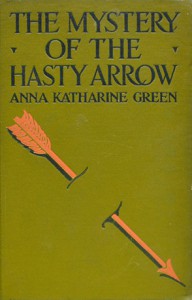
It's a long-term goal of mine to read all of Anna Katherine Green's mysteries and this one has been sitting on my shelves for awhile now.
AKG was, and is, considered a strong mystery writer, but as is true of most every writer, her work is sometimes better than others. This was one of the ones that wasn't quite so great, though still an enjoyable read. I imagine Green was going for what we'd call today a police procedural, as the murderer isn't kept a mystery; the reader is made privy to the information the same time Inspector Gryce first voices his suspicions. I'm not a procedural fan, as it contains less puzzle than I prefer. There was also a plot twist that was either poorly hidden, or I'm too jaded, but I called it from the first. Her reveal of it, though, would have knocked my socks off if I hadn't guessed early on.
Overall, I enjoyed it and look forward to acquiring more of her work.
 8
8
Tales from Margaritaville

A recent re-read for me, though I dare not try to add the dates, as I'm afraid BL will blow my original dates out.
I love these stories and continue to love them every time I read them. They remind me of my home, and their eccentric and quirky. What I didn't remember from previous re-reads was the Australian thread that runs through both the book and many of the stories. Buffett opens with a quote from Bruce Chatwin's The Songlines, in an introduction titled "Walkabout", and at least one - two? - stories include references to aboriginal myth. A small thing, but a nice parallel for a Florida girl on a decade-plus walkabout down under.
 8
8
Miss Kopp Just Won't Quit (Kopp Sisters, #4)

I always enjoy these books; they're soothing reads in many ways, as Stewart doesn't try to over dramatise or create more suspense than history dictates. (This series is based on the real events and life of Constance Kopp.) This 4th instalment surrounds the election for Sheriff, a pivotal point for Constance, because the sitting sheriff - the one that was bold enough to hire a woman - has hit his term limit and can run.
It's a bittersweet story with an interesting ending. I look forward to finding out how the Kopp sisters fare.
 9
9
 5
5
Airs Above the Ground
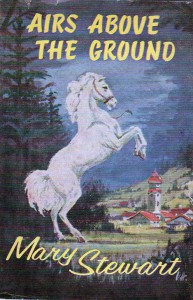
Not her best work, but a fun read nonetheless. More a straight up mystery than romantic suspense, and while the plot villain was obvious, Stewart at least had some fun misleading the reader about the plot itself.
Aside: I bought this years ago at a FOTL sale for a dollar; when I finished reading it, I saw that it was published and printed 3 blocks from where I live now. On its site now sits a 'home improvement store' - Bunnings, the Aussie answer to Home Depot. A place a spit and swear about every time I have to visit it. Now, it seems, I have even more reason to dislike it - I'd rather the book publishers were still there.
 7
7
Booklikes-opoly 2020; Pandemic edition / audit update #1
Given that I'm already behind on posts, it seems my decision to audit was a good one. After finishing Amethyst Dreams for square 6, I rolled a 7 and landed on the Robot square. I made a note of it on my RL board, and rolled again, getting a 5 and landing on a Chance square:
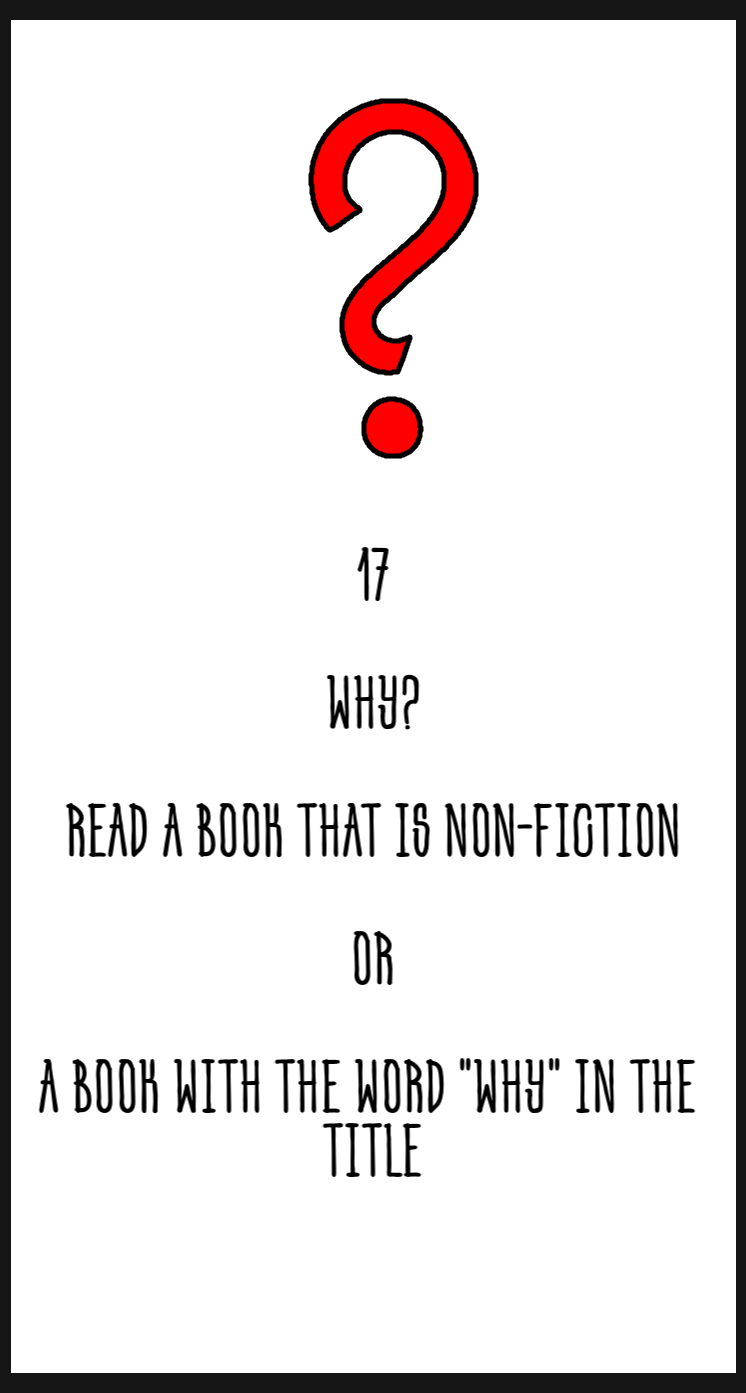
I decided on Why Shoot a Butler? because I wasn't in the mood for non-fiction, and it was on my TBR. Which it shouldn't have been, because I'd already read it, but never mind, I enjoyed reading it again.
Rolling again, I got a 5 and landed on the Cat Square, made a note and rolled again, getting a 6, which landed me on space 27. For this one, I"m going to do a re-read again, but this time on purpose. I'm choosing the anthology from Jimmy Buffet, Tales from Margaritaville, which feature a short story called Take Another Road, about a man named Tully Mars; it's definitely a tale of a hero's journey - if a somewhat eccentric one.

Why Shoot a Butler?

An accidental re-read, but an enjoyable one. As I started reading it, I remembered my frustration the first time around with the slow, purposefully vague start, but once into it, I enjoyed the banter and the mystery again - and had no recollection as to whodunnit.
 2
2
 2
2
Amethyst Dreams

Like a lot of other authors who write romantic suspense, Whitney was very hit and miss. Most of the misses I've read are the ones she wrote in her later years, and this isn't an exception. The woman could still write well - her island setting came alive - but the plot was soft and sentimental, and the resolution was not a resolution at all. In fact it was completely unrealistic, unless the poor dead woman meant less than nothing to her family.
 2
2
For Themis
Since I've been working remotely the last 2.5 months, this is what my workspace has looked like:

I had to put that stool next to the desk for 'lito; I tried 'putting it away' this past weekend and Monday morning he was pawing and scolding at me until I went and got it again. He stays there all morning, until MT gets home from his current half days at his office.
Easter-cat's domain is between the screens, where I find her waiting for me every morning:

Once MT gets home at noon, Carlito relocates to MT's lap:

 10
10
 9
9



